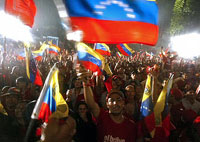Chavez’s red wave sweeps across Venezuela
The President won in each and every State of the Caribbean country. But the united opposition obtained almost 40% of the votes and its leader could turn into an obstacle for his “Socialist revolution”.

The appalling victory of President Hugo Chavez in Sunday’s presidential election painted in red all the Venezuelan diverse geography. The self-proclaimed leader of the “Bolivarian Revolution” aimed to build the “Socialism of the 21st century”, defeated the conservative opposition in all the 24 States of the Caribbean nation, including traditional anti-Chavez strongholds, as the oil-rich Zulia State governed by Chavez’s rival, Manuel Rosales.
Economical prosperity and intense social aid are the key factors to understand the overwhelming red victory, as sources in the Venezuelan government commented to Pravda.Ru in Caracas. Most of the population remains indifferent or do not pay great attention to the ideological background of their leader, but supports him because “he is one of us”, or has benefited from the ambitious social plans pushed forward by the government.
In this sense, Chavez’s intentions to perpetuate in power do not care to millions of Venezuelans that have been granted free education, healthcare and citizenship for the first time in almost 200 years of history. Previous conservative administrations offered only suffering, corruption and draconian austerity plans to the impoverished population of this oil-rich nation.
Chavez and his followers know that. They will have carte blanche for their political experiments as long as they could keep distributing oil wealth among the population. Modern transport lines, new public schools and hospitals, never seen before secure fidelity for them, but the “Bolivarian revolution” calls for more militant compromise from the population to face eventual hard times.
Chavez’s hardliners, as Lina Ron, a leader of a leftist ultra-Chavist organization in Caracas commented to Pravda.Ru that she feels that the government “is too naïve with opponents”. “We do not control key elements as the power supplying system and the telecommunications infrastructure. We could face an orange revolution in Venezuela any time”, she warns.
Mrs. Ron, as hundreds of other ultra-supporters of “Commander Chavez”, was ready to clash with the opposition in the streets of Caracas, if candidate Rosales would have been reluctant to acknowledge defeat. As thousands of Venezuelans, she greeted the reelected President under the heavy rain on Sunday night.
“Long live the socialist revolution! Destiny has been written," she heard Chavez shouting to thousands of flag-waving supporters wearing red shirts, after his appalling victory was confirmed by the National Electoral Council in Caracas. "That new era has begun," he said, raising his fist in the air. "We have shown that Venezuela is red! . . . No one should fear socialism . . . Socialism is human. Socialism is love," Chavez said. "Down with imperialism! We need a new world!"
Lina Ron says that she understands what Chavez means with Socialism. But the Venezuelan leader makes big efforts to explain to a low-educated population what does it really mean. To do so, Chavez appeals to the local nationalistic and catholic traditions of the Venezuelans. But his slogans sound as ambiguous as his ideology is. A mixture of Caribbean populism, indigenous honesty and Marxist theory will be launched in the following six years to face the “main challenges of the Revolution”, as Chavez described it: corruption and bureaucracy.
“We gave the US imperialism a new lesson of dignity. This is another defeat for the empire and for the devil – the US President George W. Bush - who tries to dominate the world”, Chavez shouted to the cheerful crowd. Chavez’s speeches usually pay tribute to the traditional anti-US spirit of the Latin American population. It is the key to understand why he is very popular, and from time to time, influent, all along the region.
The opposition in its labyrinth
The Bolivarian combination of social aid, charisma and proud nationalism, is an enigma for the decrepit conservative opposition to Mr. Chavez. Manuel Rosales, its latest candidate could be the light at the end of the tunnel for a political expression that fell into pieces when vigorous Chavez began moving forward.
Rosales united the traditionally fragmented opposition and showed there is a solid section of the electorate unhappy with Chavez’s ruling. He refused to claim fraud in an election carefully watched by hundreds of international observers who lately commented that the Venezuelan voting system is the “most advanced and democratic ever seen”. “I cannot tell lies to my people”, Rosales said after acknowledging the defeat. His words certainly avoided certain bloodshed in the streets of the polarized Caracas, as probably launched a prolific political career for the governor of the oil-rich Zulia State.
Hernan Etchaleco
Pravda.Ru
Venezuela
Subscribe to Pravda.Ru Telegram channel, Facebook, RSS!


